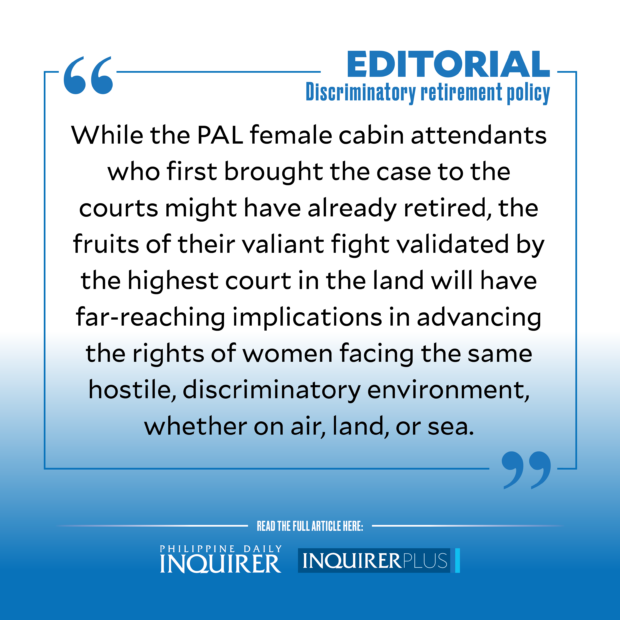
The high court, in an en banc decision released last week, voided a section of the 2000-2005 Collective Bargaining Agreement between Philippine Airlines (PAL) and the Flight Attendants and Stewards Association of the Philippines (Fasap) which set the compulsory retirement age for female cabin attendants at 55 and 60 for their male counterparts.
Such provision, according to a decision penned by Senior Associate Justice Marvic Leonen, “was deemed void for lack of basis, discriminating against women, and being contrary to laws, international convention, and public policy.’’ It stressed that equality between men and women before the law is guaranteed in the Constitution, the Labor Code, and the Magna Carta for Women, as well as in the United Nations’ Convention on the Elimination of All Forms of Discrimination Against Women.
The high court said PAL failed to provide a reasonable basis for differentiating retirement age based on gender, and that the policy was not voluntarily agreed upon by the Fasap members who petitioned against it. The voided provision covered some 600 female flight attendants hired by PAL prior to Nov. 22, 1996.
“It found insufficient proof to support the conclusion that female cabin attendants between 55 to 59 years old did not have the necessary strength to open emergency doors, the agility to attend to passengers in cramped working conditions, and the stamina to withstand grueling flight schedules unlike their male counterparts,” the ruling said. Further, it said the policy deprived the women of employment benefits five years earlier than the men and denied employment when they were “not young enough to seek for a new job but not old enough to be considered retired.’’
The Supreme Court ruling was the successful culmination of a very long fight—19 years to be exact—by female cabin attendants who started to question the discriminatory provision with the PAL management in 2004. After PAL rejected their request, the Fasap members filed a petition before a regional trial court in Makati on July 29, 2004, which issued a temporary restraining order on Aug. 10 followed by a writ freezing the implementation of the provision on Sept. 27 that year. PAL went to the Court of Appeals (CA) which upheld the management’s position and ordered the Makati Regional Trial Court (RTC) to dismiss the case. Not deterred by this setback, the female attendants elevated their case to the Supreme Court which, in 2009, reversed the CA decision and ordered the Makati RTC to continue hearing the case.
Again, the Makati RTC ruled for the petitioners. It issued in 2010 an injunction ordering PAL to stop implementing the retirement policy and in 2015 a decision nullifying the section for being discriminatory. For the second time, PAL went to the CA which, again, in 2018 reversed the RTC’s decision and upheld PAL’s retirement policy.
The CA justified the different retirement age for female attendants as part of PAL’s due diligence to ensure the safety of its passengers, pointing to the supposed biological difference between males and females which would affect the performance of their duty.
“Truly, airlines need cabin attendants who have the necessary strength to open emergency doors, the agility to attend to passengers in cramped working conditions, and the stamina to withstand grueling flight schedules,” said the CA, the very words the Supreme Court threw back at it in its decision last week.
Condescendingly, the CA said early retirement would give the female attendants “more time to spend with their families and friends,” to pursue “activities and hobbies,’’ “make positive lifestyle changes and restore a well-balanced life.’’ The CA did not say why only women, not men, should benefit from these opportunities after early retirement.
These words by the appellate court truly have no place in today’s advanced and more equitable society. While gender-based discrimination remains a reality in the Philippines, there have been significant progress in the fight for women’s rights, more so with the enactment of the 2009 Magna Carta for Women which aims to abolish gender discrimination, and provide representation and protection against violence in male-dominated sectors.
The Supreme Court itself has promoted gender equality. On Feb. 15, 2022, it issued guidelines on the use of gender-fair language and gender-fair courtroom etiquette for the judiciary, stating that sexist language “devalues members of one sex, almost invariably women, and thus fosters gender inequality.’’
And while the PAL female cabin attendants who first brought the case to the courts might have already retired, the fruits of their valiant fight validated by the highest court in the land will have far-reaching implications in advancing the rights of women facing the same hostile, discriminatory environment, whether on air, land, or sea.